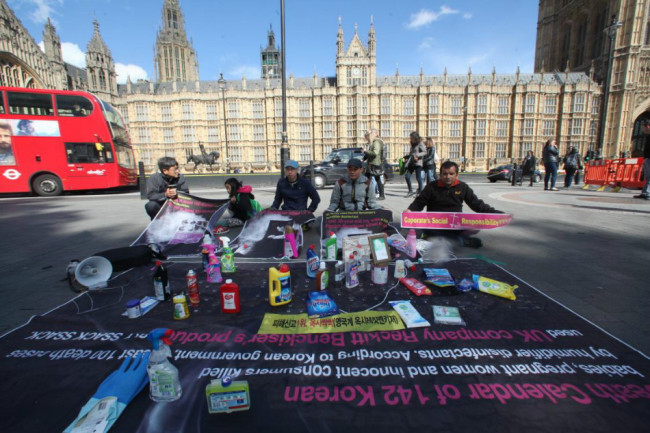Lee Ye-do, a 46-year-old office worker in Daejeon, lost his wife earlier this month. She suffered from a mystery lung-related disease for more than a decade.
“When the symptoms first showed years ago, doctors couldn’t figure out the cause. She received pneumonia treatment because the symptoms were similar. But her condition didn’t get better,” Lee recalled. It was around the time she gave birth to their second son in 2001, he told The Korea Herald.
In 2011, the couple finally found out that she was one of the many victims associated with a toxic humidifier disinfectant. The health authorities discovered that there was a “significant association” between the use of the humidifier disinfectant and lung-related diseases, especially among children and pregnant women.
 |
Victims of the effects of humidifier disinfectant hold a campaign in front of the Houses of Parliament in London on May 19. (Yonhap) |
Lee’s family used Oxy Ssak Ssak, a liquid humidifier disinfectant produced by British company Reckitt Benckiser, every winter from 2001 to 2010, he said. Oxy Ssak Ssak, which was only sold in Korea from 2002, had a market share of about 80 percent in Korea among 20 similar other brands. All products were later withdrawn from the local market.
As of now, more than 500 Korean users of humidifier disinfectants are reported to have been affected, with 221 confirmed to have suffered lung damage, the Korean authorities said. Of them, 92 died of lung-related diseases. The civic groups argue that the official death toll should be 142, as victims of other types of diseases need to be included.
Lee and other victims’ families are now gearing up to launch a legal battle against the disinfectant’s manufacturer.
The group of victims’ families and activist group Asian Citizen’s Center for Environment and Health vowed Wednesday to seek legal action against the company over the deaths of more than 100 people.
“We are currently discussing the case with two British law firms. The lawyers said civil and criminal suits are both likely,” ACCEH director Lim Heung-kyu told The Korea Herald.
The victims’ families and Korean activists visited the Reckitt Benckiser headquarters earlier this month to urge the company to take responsibility and issue an apology.
They claimed that the company falsely advertised its products as safe even though the disinfectant contained toxic substances. The Korean Free Trade Commission has also confirmed that the Berkshire-based company was guilty of wrongly promoting its product as “safe for humans.”
In response, the headquarters only provided a document, asking them to talk to the Korean branch of Reckitt Benckiser, the victims’ group said.
The Korean branch office, however, has also remained silent on the issue despite the results of the government’s official inquiry.
Regarding the lawsuit, it refused to comment, simply saying, “We have at all times sought to act in good faith and in the best interests of all parties. We have no comment on the legal action.”
So far, most of the victims’ families have not received compensation, either from the government or the company, except for coverage for the medical costs from the government.
They filed a lawsuit against the government for negligence in product monitoring but they lost the case earlier this year. The local court ruled that the state could not take responsibility for the deaths as there was no evidence that authorities knew of the harmfulness of the disinfectant in advance.
The Environment Ministry, however, recently designated Asan Medical Center in Seoul as the main hospital to look for a causal link between the chemical exposure and the illnesses as part of efforts to further confirm the health impacts of the chemicals, officials said.
AMC will also monitor the health records of the disinfectant victims and their families and take charge of their health care and treatment, they added.
By Lee Hyun-jeong (
rene@heraldcorp.com)





![[Exclusive] Hyundai Mobis eyes closer ties with BYD](http://res.heraldm.com/phpwas/restmb_idxmake.php?idx=644&simg=/content/image/2024/11/25/20241125050044_0.jpg)
![[Herald Review] 'Gangnam B-Side' combines social realism with masterful suspense, performance](http://res.heraldm.com/phpwas/restmb_idxmake.php?idx=644&simg=/content/image/2024/11/25/20241125050072_0.jpg)

